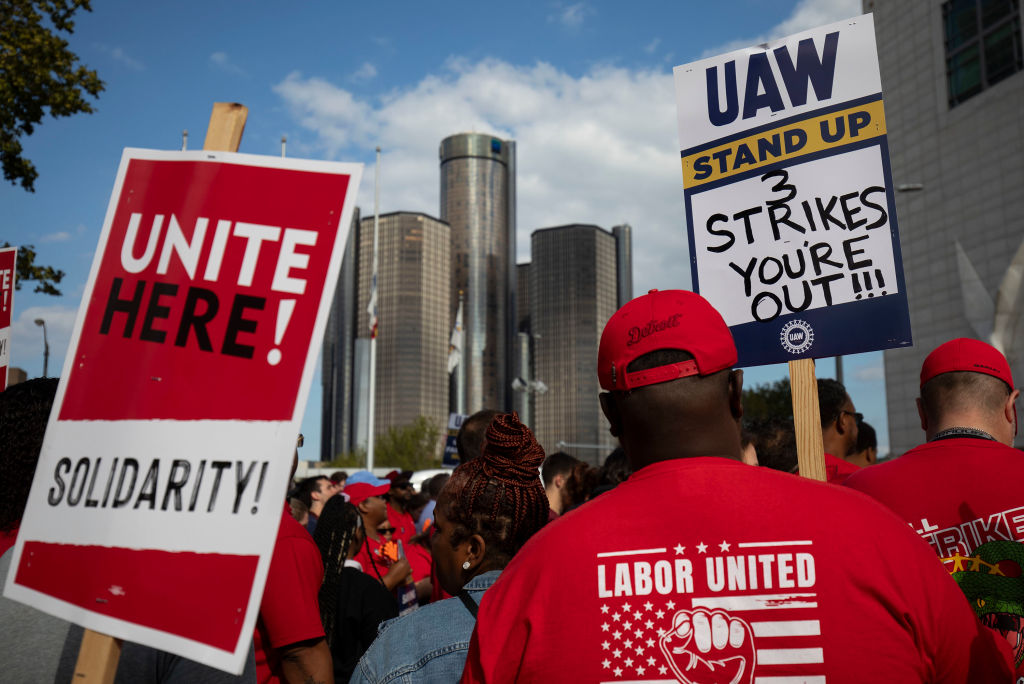Did you know that Truthout is a nonprofit and independently funded by readers like you? If you value what we do, please support our work with a donation.
Despite reaping tens of billions of dollars in profits between them over the past five years, General Motors and Ford paid an average combined tax rate of just 1% on total pre-tax income, an analysis published Tuesday by economic justice advocates revealed — as the auto giants claimed they cannot afford striking workers’ demands for better pay.
The Americans for Tax Fairness (ATF) analysis — which posits that “the tax system is rigged to benefit multinational corporations over the workers who keep them running” — notes that over the past five years, GM and Ford made a total of $34 billion and $8 billion respectively, but paid an effective federal tax rate of only 1.3% for GM and -0.2% for Ford.
“While some of those tax savings have found their way into rapidly rising compensation packages for the firms’ top executives and board members, wages of rank-and-file workers have lagged,” the report states. “Average executive pay at GM and Ford grew by 32% over the past five years, while median autoworker pay grew by just 8.8% over the same period, widening the executive-to-worker pay gap to 183-to-1.”
“Over that same period, GM and Ford paid out a combined total of $14 billion in dividends (34 times more than they paid in taxes), spent $3.6 billion on stock buybacks (nine times more than they paid in taxes), and lavished $614 million on top company executives (50% more than they paid in taxes),” the publication continues.
The analysis comes five days into a “stand-up strike” by around 13,000 United Auto Workers (UAW) members at GM, Ford, and Stellantis plants. The workers are seeking better pay and benefits.
“General Motors and Ford are refusing to meet UAW’s demands, claiming that what workers are asking for is unreasonable,” the report states. “An Americans for Tax Fairness analysis of GM and Ford’s most recent [Securities and Exchange Commission] filings finds that what is truly unreasonable is how the auto giants get away with paying practically nothing in federal taxes while further enriching their top executives with huge pay packages and their shareholders with dividend payments and stock buybacks.”
ATF executive director David Kass argued that “Ford and GM have thrown their priorities into reverse.”
“They’re overcompensating their already wealthy executives, board members, and shareholders, while shortchanging the workers and nation that made their success possible,” Kass continued. “They need to offer serious proposals for sharing the wealth with rank-and-file employees and start paying their fair share of taxes.”
Kass additionally asserted that the National Labor Relations Board “must ensure these corporations treat their workers justly; and in its upcoming budget negotiations, Congress must ensure big corporations like Ford and GM are contributing what they should to America’s fiscal health.”
Corporate tax dodging is pervasive in most U.S. industries. According to a Government Accountability Office (GAO) analysis commissioned by Sen. Bernie Sanders (I-Vt.) and released in January, more than a third of large, profitable corporations in the United States paid no federal income tax in 2018, the year that the so-called Republican “tax scam” signed into law by then-President Donald Trump took effect.
The GAO report also found that “average effective tax rates — the percentage of income paid after tax breaks — among profitable large corporations fell from 16% in 2014 to 9% in 2018.”
Other analyses of more recent data confirms the trend continues. A Center for American Progress study of 2021 investor filings for Fortune 100 companies revealed that 19 of the largest profitable corporations in America “are paying effective tax rates that are in the single digits — or paying nothing at all.”
Press freedom is under attack
As Trump cracks down on political speech, independent media is increasingly necessary.
Truthout produces reporting you won’t see in the mainstream: journalism from the frontlines of global conflict, interviews with grassroots movement leaders, high-quality legal analysis and more.
Our work is possible thanks to reader support. Help Truthout catalyze change and social justice — make a tax-deductible monthly or one-time donation today.
